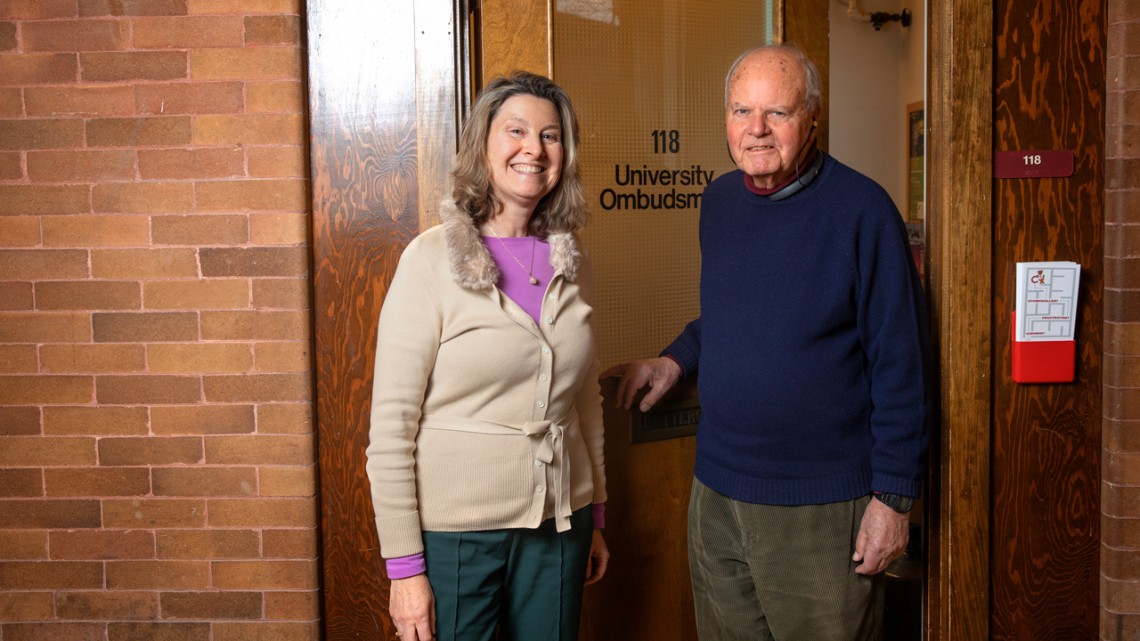
Linda Falkson ’86, left, director of the ombudsman’s office, and Charles Walcott, Ph.D.’59, university ombudsmen, stand at the door of their Stimson Hall office.
Ombudsman office marks 50 years of serving campus
By Daniel Aloi
The Office of the University Ombudsman marked its 50th anniversary in 2019, serving as a sounding board for faculty, staff and students to come with issues large or small related to their life at Cornell.
The office in 118 Stimson Hall typically welcomes 300 to 400 Cornellians a year with a variety of concerns, whether academic, financial, employment-related, ethical or interpersonal.
“We serve a broad spectrum of people from across the university,” said university ombudsman Charles Walcott, Ph.D. ’59. “One of the problems that we face is, I don’t think people really know what an ombudsman is. It’s not intuitively obvious.”
The process, by design, is informal – anyone from the Cornell community can call, email or walk in to discuss an issue or concern confidentially. Contact with the office can be anonymous, and no advance information about yourself or the nature of the visit is required.
“The fundamental thing that we do is provide a place for people to come and talk about issues,” Walcott said. “And we try and offer them alternatives – what might you do, and if you did it, what’s likely to happen.”
Much of the role, he said, “is us trying to be helpful, and at the same time, to give them, give students [in particular], an idea of how the university works.”
The tenets of the office are: confidentiality, informality, neutrality and independence.
“It’s helpful just to allow someone to be in a safe space, free of judgment, where they have the opportunity to hear themselves speak, say what their truth is and be heard by someone who cares,” said Linda Falkson ’86, director of the ombudsman’s office. “I always have to remind myself that even if in the conversation we’re not to the point of problem-solving, that we’re in a place of providing what all of us deserve, which is human dignity.”
The ombudsman advocates for fairness, Walcott said – not for individuals or the university, but as an asset to both. The office maintains confidentiality in all matters, even in “upward feedback” when the need arises to inform administrators and relevant parties of a trend or systemic issue.
If a formal proceeding is required to help resolve an issue, then advice on that process is offered. For example, if an issue of perceived bias or harassment is revealed, the relevant policy and the process will be explained and the ombudsman will help make it comfortable for the individual to be referred to the Office of Institutional Equity and Title IX.
“We want our doors to be open for whatever it is, whether it’s relatively minor or quite serious,” Falkson said, “and we also like to have people come [to us] before it’s become a really longstanding, intractable problem so that we can try to offer options and resources.”
The Office of the University Ombudsman was established in August 1969 on the recommendation of a committee led by Alfred Kahn, then dean of the College of Arts and Sciences. Professor Alice Cook was appointed Cornell’s first ombudsman by President Dale Corson, and served until 1971.
“I think the basic realization back then, as now, is that if you have an office where people can go and try and resolve conflicts, or try and figure out what to do, you defuse things that might well grow into real, very serious problems,” Walcott said.
The office’s original guidelines were formalized in 1971 and have remained virtually unchanged since. The University Assembly passed a resolution in 2013 to adopt updated guidelines for the office, to clarify its mission and best practices in the profession in accordance with the International Ombudsman Association Code of Ethics and Standards of Practice. The University Assembly also unanimously passed a resolution Nov. 5 in recognition of the office’s anniversary.
The office is independent of the university but can act as intermediary to help individuals gain access to someone in a position of authority. For example, with their permission, visitors can be referred to a dean or vice president.
“When we’re referring people for resources, we have some kind of knowledge and expertise about all the resources at the university, who they might want to talk to, and then coaching them to have that conversation,” Falkson said.
The ombudsman also serves people studying and working across the state, including at Cornell Tech, and Cornellians abroad, through platforms such as Skype.
As Cornell becomes more diverse and globalized, Falkson said, the client base has changed in some ways. However, “in general, the human condition hasn’t so much changed. And in terms of the problems or conflicts or issues that community members have, I’m not sure that that has appreciably changed over the years.”
Walcott, who was named university ombudsman in 2011, is a professor emeritus of neurobiology and behavior in the College of Agriculture and Life Sciences, and former director of the Lab of Ornithology, dean of the University Faculty and chair of the University Assembly. Falkson served in the judicial administrator’s office for 10 years before her current role.
Media Contact
Get Cornell news delivered right to your inbox.
Subscribe
